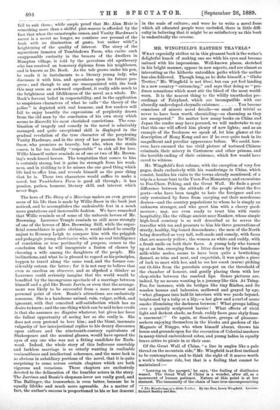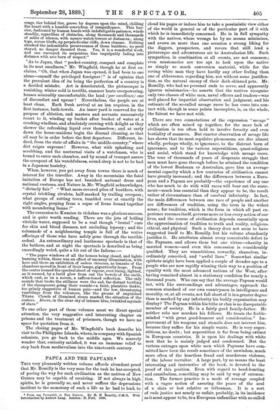MR. WINGFIELD'S EASTERN TRAVELS.*
WHAT especially strikes us in this pleasant book is the writer's delightful knack of making one see with his eyes and become imbued with his impressions. Well-known places, sketched in his bright manner, appear in new aspects, and are almost as interesting as the hitherto untrodden paths which the author has also followed. Though long, as he dubs himself, a " Globe Trotter," Mr. Wingfield is not blasj, but can yet feel landing in a new country " entrancing," and says that doing so " pro- duces sensations which must stir the blood of the most world-
worn. It is the nearest thing to the wildly unorthodox pro- ceedings of Fairyland, which are incompatible with our absurdly undeveloped chrysalis existence You become conscious of minute novel details—so small and trivial as never to have been worth chronicling—as charming as they are unexpected." No matter how many books on China and Japan the reader may have perused, we will undertake to say that this one will afford him plenty of new lights ; and as an example of the freshness we speak of, let him glance at the description of Hong Kong and see if he ever quite took in its magnificent and peculiar appearance before. We could, how- ever, have excused the too vivid picture of tortured Chinese criminals, their misery in Cantonese and other prisons, and the horrible ending of their existence, which few would have cared to witness.
Mr. Wingfield's first volume, with the exception of very few pages, deals exclusively with his wanderings in China, which consist, besides his visits to the towns already mentioned, of a trip in a house-boat to the Yuen-Foo Monastery, and excursions to Foo-Chow, Peking, and the Great Wall. He finds a great difference between the attitude of the people about the five ports—who have been taught to hate the foreigner and are only restrained by force from carrying out their murderous desires—and the country populations to whom he is simply an unknown stranger, and who greet him with a cheery good- morrow ; nay, are even ready to treat him with rustic hospitality, like the village ancient near Nankow, whose simple high-bred courtesy is so well described as he serves the traveller with tea and presents to him his three generations of sturdy, healthy, big-boned descendants ; the men of the North being described as very tall, well-made and comely, with faces that are scarcely yellow ; the women as white and ruddy, with a frank smile on both their faces. A young lady who turned up at an inn, emerging from a litter drawn by two handsome milk-white mules, seems to have been quite a bewitching damsel, so trim and neat, and coquettish, it was quite a piece of luck to meet with her, and to see her amah (nurse) picking out tit-bits from the porcelain soup-pot on the threshold of the chamber of honour, and gently placing them with her chop-sticks between the rosebud lips. Genre pictures are, indeed, by no means wanting in a journey like this. At Tsing- Poo, for instance, with its bridges like tiny Rialtos, and its wooden houses and balconies, mellowed and grayed by age, " what glimpses into half-lit interiors with wee yards beyond, brightened by a tulip or a lily,—a hot glow and a curl of azure smoke illumining the darkness between ! What groups lolling over a quaintly sculptured barrier ! What effects of vivid light and darkest shade, as fresh, ruddy faces gaze shyly from a casement !" Or again, at Soochow, groups of pleasure- seekers enjoying themselves in the kiosks and gardens of the Magnate of Ningpo, who when himself absent, throws his house and grounds open for the recreation of Celestial mashers in many-tinted embroidered robes, and young ladies in equally brave attire to picnic in at their ease.
Of the Great Wall of China, " a line in angles like a pale thread on the mountain side," Mr. Wingfield is at first inclined to be contemptuous, and to think the sight of it scarce worth a week's toilsome ride, but that is a feeling that cannot be maintained :-
"Leaning on the parapet,' he says, 'the feeling of disillusion waned. The Great Wall of China is a wonder, after all, as a monument of human patience. Nature at this point is at her sternest. The immensity of the chain of bare iron uncompromising • The Wanderings of a Globe Trotter. By the Hon. Lewis Wingfield. 1#01111.01(1: Richard Bentley and Bon.
crags, tier behind tier, grows by degrees upon the mind, chilling the heart with a humble conviction of insignificance. This bar- rier, fashioned by human hands with indefatigable patience, winds steadily, regardless of obstacles, along thousands and thousands of miles of silence, with square watch-towers at distances ; along tops, across bluffs, up perpendicular cliffs, down chasms. Nothing checked the indomitable perseverance of these builders; no peril stayed, no danger daunted them. Yes, it is a wonderful work, and one surveyed its serpentine line impalpably fading into distance with awe born of respect."
'As to Japan, that " pocket-country, compact and complete in its neat smallness," Mr. Wingfield, though he at first ex- claims, " Oh, that when Japan was opened, it had been to one alone—oneself the privileged foreigner !" is of opinion that the prevalent idea of its being the perfection of a country is a decided mistake. Art is deteriorated, the picturesque is
vanishing, winter cold is terrilile, summer heats overpowering, houses miserably uncomfortable, the land (par excellence) one
of discomfort and uproar ! Nevertheless, the people are at least clean. Each fresh arrival at an inn requires, in the first instance, bath-towels. An inner yard is reserved for the purpose of ablation, and masters and servants successively resort to it, winding up bucket after bucket of water at a creaking windlass, and absolutely crowing with delight as they shower the refreshing liquid over themselves ; and at early dawn the house-maidens begin the diurnal cleaning, so that all may be in order before the first departure. Different, in- deed, from the state of affairs in " the middle-country," where dirt reigns supreme ! However, what with splashing and scrubbing, and the nocturnal visits of a watchman, who is
bound to enter each chamber, and by sound of trumpet assure the occupant of his watchfulness, sound sleep is not to be had in a Japanese hostelry.
When, however, you get away from towns there is much of interest for the traveller. Away in the mountains the fatal imitation of Europe has not banished national dress and national customs, and Nature is, Mr. Wingfield acknowledges, " divinely fair." " What moss-covered piles of boulders, with crystal trickling rivulets, half-masked by trailing creepers ; what groups of rotting trees, tumbled over at exactly the right angles, peeping from a copse of ferns bound together with meandering lianas !"
The excursion to Kusatsu in rickshas was a glorious success, and is quite worth reading. There are the jets of boiling vitriolic water, supposed to be a real though " brutal " cure for skin and blood diseases, not excluding leprosy; and the colonnade of a neighbouring temple is full of the votive offerings of those who have safely gone through the terrible ordeal. An extraordinary and loathsome spectacle is that of the bathers, and at night the spectacle is described as being exceedingly weird, quite a bit out of the Inferno
The paper windows of all the houses being closed, and lights burning within, there was an effect of uncanny illumination, with here and there an exhibition of ombres chinoises, as tenants of the chambers moved in front of their lamps, gigantically large. From the centre loomed the spectral sheet of vapour, ever rising, lighted, as it seemed, by a lurid glow from out the bowels of the earth, which cast, as on a screen, a saffron-toned reflection. The only sounds that broke the stillness were the sad, far-distant tootling of the shampooers going their rounds—a faint, plaintive tinkle, too grimly suggestive of human pain—and the low, threatening rumblings from the volcanoes, like the groans of anguished Titans. Clouds of illumined steam marked the situation of the craters. Above, in the clear sky of intense blue, twinkled myriads of stars."
To one other part of these volumes must we direct special attention, the very suggestive and interesting chapter on prisons and the treatment of prisoners, though we have no space for quotation from it.
The closing pages of Mr. Wingfield's book describe his visit to the Philippine Islands, where, in company with Spanish colonists, you go back to the middle ages. We scarcely wonder that, curiosity satisfied, it was an immense relief to step back from meditwalism into the nineteenth century.







































 Previous page
Previous page